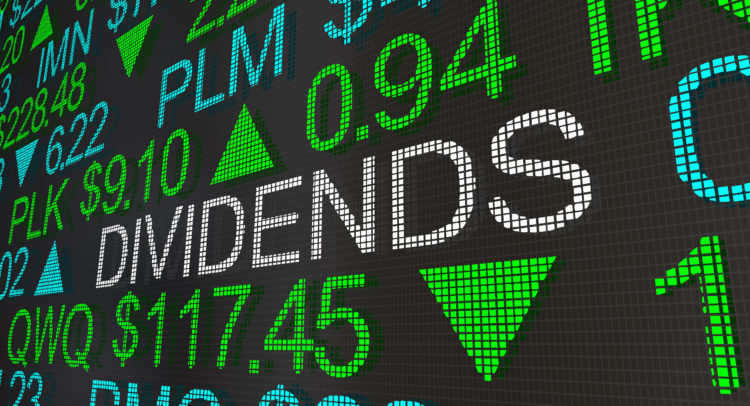Dividend stocks have experienced superior performance to most non-dividend-paying stocks since the start of the U.S. Federal Reserve’s interest rate hike cycle, which was initiated in March this year.
Elevate Your Investing Strategy:
- Take advantage of TipRanks Premium at 55% off! Unlock powerful investing tools, advanced data, and expert analyst insights to help you invest with confidence.
The bias towards dividend assets should not be a surprise, as a flight to safety is common during an interest rate hike cycle, as investors tend to demand income-generating investments whenever the economy contracts and the stock market falls. The cause of this herding effect is mainly psychological; nonetheless, it provides an anomaly for tactical stock traders to latch onto.
After screening TipRanks’ database for high-dividend stocks, I decided that ETFs provided a more convenient alternative; I am bullish on the following four dividend-granting ETFs.
1. iShares U.S. ETF Trust iShares GSCI Commodity Dynamic Roll Strategy ETF (COMT)
The iShares Commodities Select Strategy ETF is an actively-managed fund that profits by trading various forward and futures contracts. The ETF is managed by BlackRock (NYSE: BLK) and has achieved nearly 20% in year-to-date returns (not including dividends), which speaks volumes if one considers that the S&P 500 (SPX) is down about 22% on the year.

As previously mentioned, the ETF is an actively-managed fund that generates income by frequently trading financial products. Thus, there aren’t any stocks under this ETF’s management.
Furthermore, the iShares Commodities Select Strategy ETF is ideally placed to outperform other ETFs in today’s market, as its active strategy allows it to bet for and against asset prices, thus taking advantage of a bear market instead of crumbling under pressure.
The most appealing feature of this ETF is its dividend prospects. The fund exhibits a dividend yield worth 14.6%, placing it in the upper echelon of dividend-paying ETFs. Moreover, its dividend distributions have grown exponentially over the past five years, meaning that it’s not just a flash in the pan.
2. SPDR SSgA Multi-Asset Real Return ETF (RLY)
State Street’s Multi-Asset Real Return ETF invests in numerous exchange-traded products to achieve alpha. The ETF is often exposed to inflation-hedging products such as TIPS (inflation-linked bonds), commodities, and real estate, providing it with a luring investment profile in today’s market climate.
The fund’s current exposure places conviction on primary production sectors like energy and basic materials. Its strategy could yield excellence as energy stocks look set for a multi-year bullish trend amid utility shortages in Europe, the United Kingdom, and Sub-Saharan Africa. Furthermore, global inflation remains resilient; thus, exposure to basic materials as an inflation hedge could be compelling to investors.
As for its dividend attributes, State Street’s Street’s Multi-Asset Real Return ETF sports a dividend yield of 12.94%, accompanied by a five-year compound annual growth rate of 47.05%. As such, this ETF definitely owns the capacity to fuel a sustainable second income for its investors.
3. Inspire Tactical Balanced ESG ETF (RISN)
RISN is a North Lights Fund ETF with an investment thesis emphasizing environmental, social, and governance investing. Approximately 45% of the fund is invested in floating-rate bond ETFs, while the remainder of its capital is typically allocated towards highly-rated ESG securities. A few of the fund’s holdings include Analog Devices (NASDAQ: ADI), Service Now (NYSE: NOW), Intuitive Surgical (NASDAQ: ISRG), and HCA Healthcare (NYSE: HCA).
ESG is an underrated concept. Firstly, ESG and impact or green investing should not be confused. While impact investing focuses on the greater good, ESG focuses on how environmental efficiency, social balance, and robust governance can contribute to overall profitability. Furthermore, it has been statistically proven that high-ESG stocks often outperform low-ESG stocks, thus, presenting investors with an excess return anomaly.
Lastly, RISN boasts an incredible dividend package. The ETF’s 11.73% dividend yield is somewhat astounding, considering much of it is derived from the fixed-income markets. In addition, ESG is a growing concept, providing many reasons why this ETF’s dividend attributes could proliferate in the coming years.
4. Emles Federal Contractors ETF (FEDX)
Innovation and dividends rarely go hand in hand, as high-growth innovation companies usually deploy their residual income into growth initiatives. However, Emles Federal Contractors ETF solves the issue as it pays an inviting dividend yield of 14.75% while investing in various growth firms, namely Apple (NASDAQ: AAPL), CrowdStrike (NASDAQ: CRWD), Microsoft (NASDAQ: MSFT), and NVIDIA (NASDAQ: NVDA).
The ETF is managed by Emles Advisors and carries with it a promising value-to-growth rotational strategy. Furthermore, the fund is managed cost-effectively, with an expense ratio of just 0.49%.
This is a solid ETF for investors looking for additional risk without treating their investment portfolios like a game of roulette.
Concluding Thoughts
Investors often favor dividend-paying ETFs during bear markets. The ETFs mentioned in this article provide exposure to various parts of the financial markets and could deliver dividend yields in excess of 10%.
















